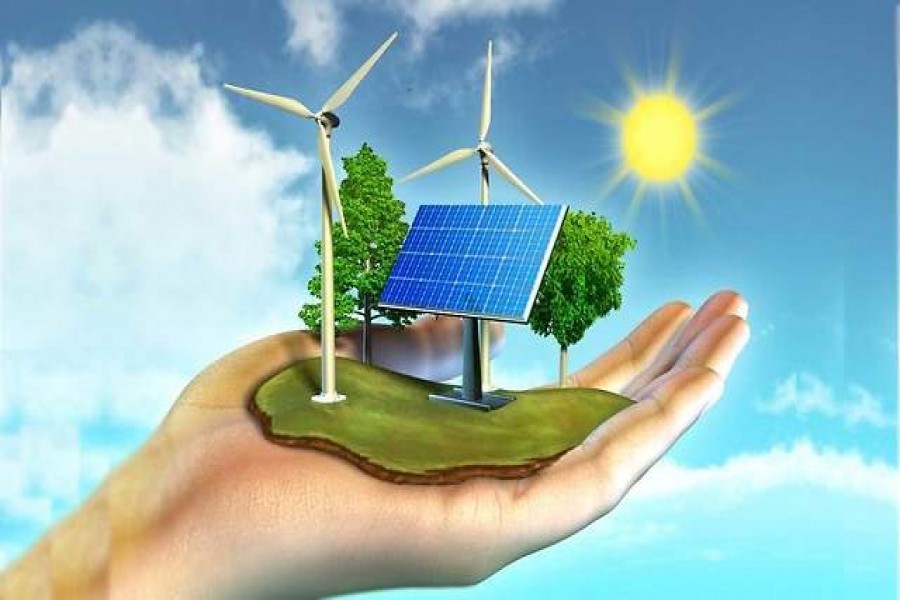Renewables come on fast track in contract awarding to generate around 1,000 megawatts of electricity to manage power shortage in Bangladesh for fossil-fuel crisis.
Officials say the government recently made a decision to increase the use of renewable energy against the backdrop of scarcity of conventional fuel like petroleum products, natural gas, and LNG and their soaring prices on the international market.
"The ongoing Russia-Ukraine war has exposed a new dimension of primary energy situation across the globe, which has prompted us to expedite the move to increase the share of renewable energy in the overall electricity-output basket," Prime Minister's energy adviser Dr Tawfiq-e-Elahi Chowdhury Bir Protik told the FE Tuesday.
"With the implementation of the new renewable energy plants we shall be able to generate electricity without purchasing any fossil fuel, which has now scarcity in the world," he adds.
Mr Chowdhury hopes Bangladesh will be able to reduce the import of fuels and save valuable foreign currencies with the implementation of the planned renewable-energy projects, within next one and a half years
As per the plan the government will provide land to interested sponsors to build solar power plants. Floating solar projects and running irrigation pumps through solar plants instead of diesel will be encouraged, he says.
Apart from the planned 1,000MW renewable-energy projects, the country currently has a dozen under-construction renewable energy-based projects to add around 562MW electricity in total, according to Power Division under the Ministry of Power, Energy and Mineral Resources.
Of the total renewable energy projects that are under construction, solar-based power plants being built by private sector are eight in number and will have generation capacity of 406.5MW in total.
State-run power companies are building two solar power plants to generate 51MW electricity in total.
Private-sector sponsors are also building one wind-based power plant to generate 60MW electricity and one waste-based power plant to generate 42.5 MWs.
One state-run power entity is building another 2.0MW-capacity wind power plant, the Power Division statistics revealed.
Despite having dormant power-generation capacity, Bangladesh has enforced up to eight hours of electricity load-shedding daily in different areas across the country--the worst in past one decade--as it is limiting power generation to cut down the import of fossil fuels from the volatile international market to save foreign currencies amid dollar crunch.
Natural gas is the main fuel for electricity generation in Bangladesh.
At present natural gas-based power plants have capacity of around 11,162 MWs, accounting for 52 per cent of total capacity of 21,710 MWs. Furnace oil-based power plants have 5,925MW generation capacity, or 27 per cent of the total, diesel-fired plants have 1,286 MWs, or 6.0 per cent of the total capacity, and coal-fired capacity is around 1,688 MW or 8.0 per cent, official data showed.
Bangladesh has very low renewable-based generation, with hydropower at 230 MWs or 1.0 per cent of total and solar at 229 MWs or 1.0 per cent. The country it also imports around 1,160 MWs, or 5.0 per cent of the capacity of power generation, from India.
But adding new electricity from renewables from the under-construction plants and fast-track initiatives will ramp up the stake of renewable energy in overall electricity-generation basket significantly and reduce Bangladesh's dependency on both natural gas and petroleum.
It will also help rectify a target of ensuring 10 per cent of its overall electricity generation from renewable energy by 2020, which was set under Bangladesh's Renewable Energy Policy 2008.
In a move to reduce energy imports for saving foreign exchange Bangladesh has ceased importing LNG from overheated spot market since July 2022.
It has also been importing the lowest quantity of liquefied natural gas (LNG) from its two existing long-term suppliers - -- Qatargas and Oman Trading International, currently known as OQ -- as the government prefers importing less energy amid tightening energy consumption through austerity to save falling forex reserves.
The country is importing 20-percent less LNG cargo from its two long-term suppliers in October and November compared to its September imports as it is importing four LNG cargoes, each carrying around 138,000 cubic meters, this month.
LNG re-gasification also dipped to the lowest level to around 380 million cubic feet per day (mmcfd), which is only 38 per cent of the aggregated re-gasification capacity of the country's two 3.75-million-tonne per year, or MTPA, capacity, according to official data as of November 8, 2022.
One year back in November 2021 Bangladesh re-gasified around 850 mmcfd of LNG as the country then imported LNG from spot market alongside its imports from long-term suppliers, according to Petrobangla data.
Bangladesh is struggling to feed gas-guzzling power plants and industries apart from other sectors due to dwindling domestic natural gas output and skyrocketing LNG prices on the international market, Petrobangla chairman Nazmul Ahsan said.
Around half of the total power-generating plants now remained idle as the plant owners - both in public and private sectors - cannot afford to run the plants importing expensive fossil fuels.
Soaring price and scarcity of other main source --petroleum oil - is also limiting Bangladesh's overall electricity generation, against growing demand.
Many private oil-fired power plants could not generate electricity from their plants as they lack necessary fuels, president of Bangladesh Independent Power Producers Association (BIPPA) Imran Karim said.
According to BPDB, countrywide electricity generation during day peak hours was around 10,385MW and during evening peak hours around 11,166 MWs against the overall generation capacity of 21710 MWs as on November 7, 2022.
Bangladesh's foreign-exchange reserves last week declined further to around $34.42 billion, mainly due to soaring energy costs stemming from the Russia-Ukraine war and a latest ACU payment, according to data from the country's central bank.


